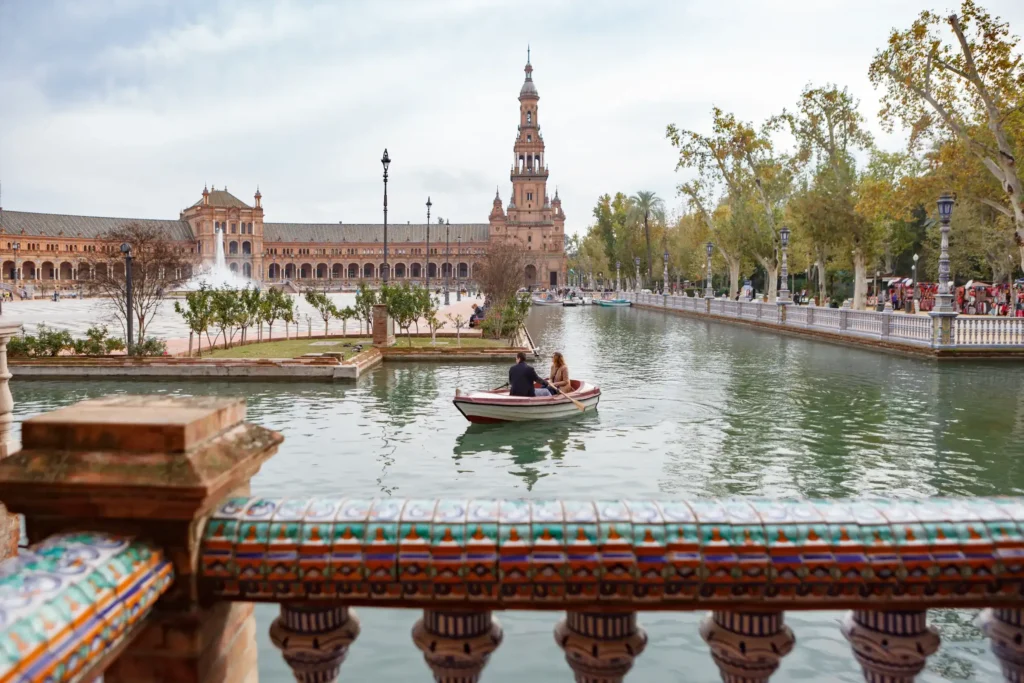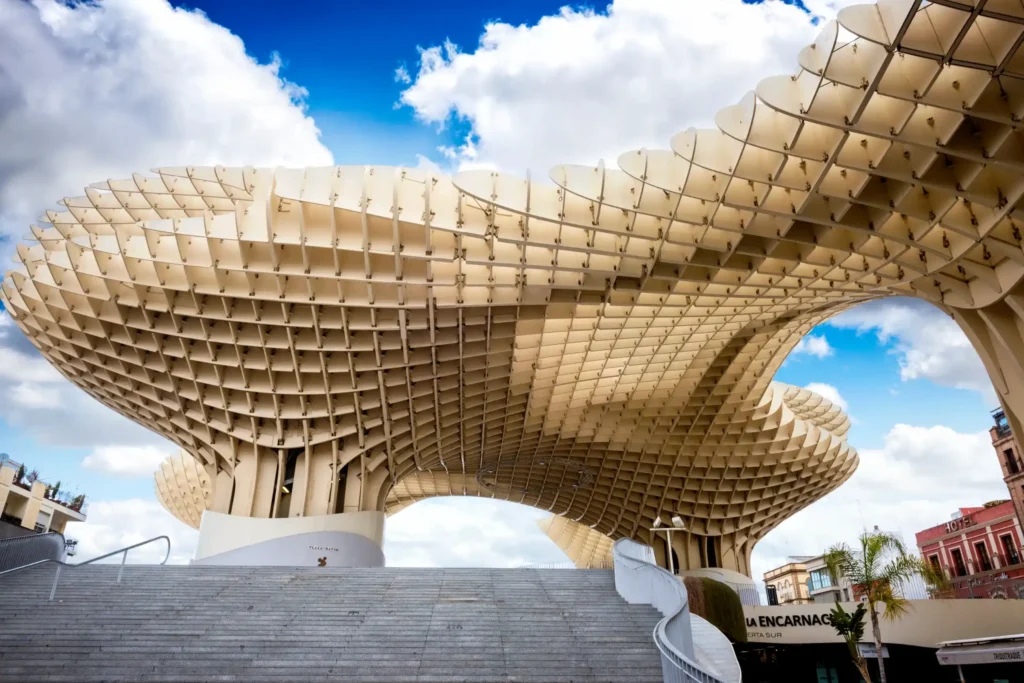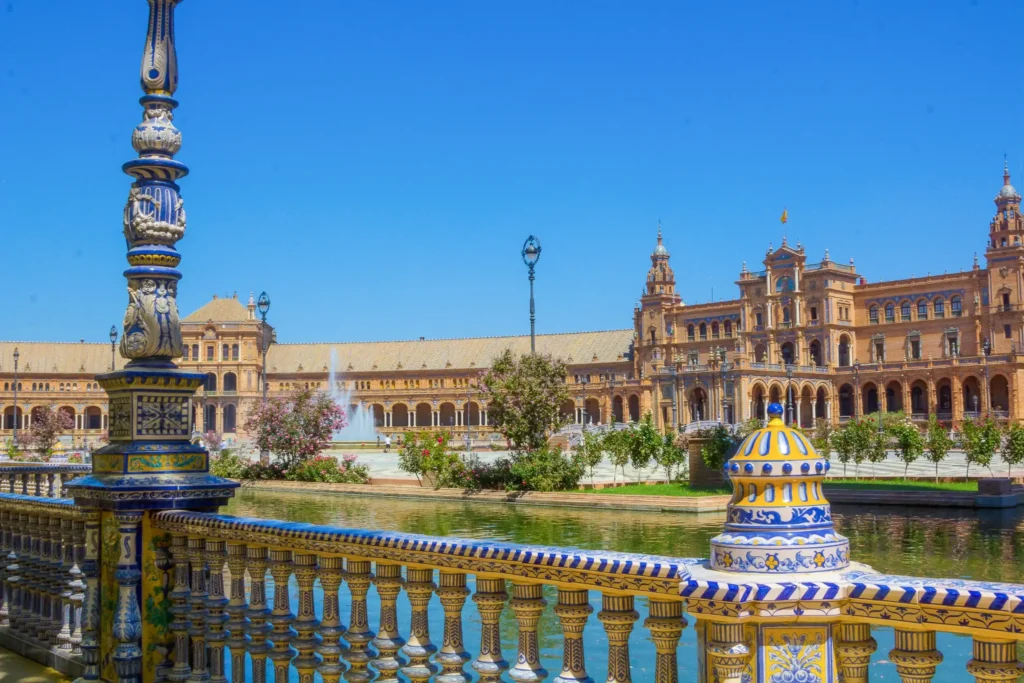Seville, the capital of Andalusia, is a vibrant city steeped in rich history, captivating architecture, and a lively cultural scene. Known for its flamenco music, tapas bars, and Moorish influence, Seville offers a perfect blend of tradition and modern charm. If you’re short on time, this 2-day itinerary will guide you through Seville’s top sights, ensuring you experience the best of what the city has to offer.
Day 1: Exploring the Heart of Seville

Morning: Start at Plaza de España
Begin your adventure at Plaza de España, one of Seville’s most iconic landmarks. Built for the Ibero-American Exposition of 1929, this vast semicircular plaza is a masterpiece of Spanish Renaissance Revival architecture. Walk along the beautiful bridges that span the small canal or rent a rowboat for a unique perspective. Each province of Spain is represented by a colorful tile alcove, perfect for photos.
Explore the Maria Luisa Park
Adjacent to the Plaza de España is the Maria Luisa Park, a lush green space perfect for a leisurely stroll. This sprawling park is filled with palm trees, fountains, and charming pavilions. It’s the perfect place to escape the city’s hustle and enjoy some tranquility before heading to your next destination.
Late Morning: Seville Cathedral and La Giralda
Next, head to the Seville Cathedral, the largest Gothic cathedral in the world and a UNESCO World Heritage Site. Inside, you’ll find impressive altars, chapels, and even the tomb of Christopher Columbus. Take the time to climb La Giralda, the cathedral’s bell tower and former minaret. The panoramic views of Seville from the top are simply breathtaking.
Lunch: Taste Tapas in Santa Cruz
For lunch, venture into the Santa Cruz neighborhood, Seville’s old Jewish quarter, filled with narrow cobbled streets and hidden plazas. This area is known for its tapas bars, where you can sample traditional Andalusian dishes like jamón ibérico, salmorejo, and tortilla de patatas. Some popular spots include El Rinconcillo and Las Teresas.
Afternoon: Alcázar of Seville
After lunch, make your way to the Royal Alcázar of Seville, a stunning palace complex that showcases a mix of Mudéjar, Gothic, Renaissance, and Baroque architectural styles. The Alcázar was originally built as a Moorish fortress, and today it’s still used as a royal residence. Explore its magnificent rooms, including the Hall of Ambassadors, and don’t miss the lush gardens filled with fountains, orange trees, and peacocks.
Evening: Flamenco Show
No trip to Seville is complete without experiencing a flamenco performance. Head to a traditional tablao (flamenco venue) like El Arenal or Casa de la Memoria to watch passionate dancers, singers, and guitarists perform this quintessential Andalusian art form. It’s an unforgettable way to end your first day in Seville.
Day 2: Cultural Gems and Local Experiences
Morning: Metropol Parasol

Start your second day at the modern Metropol Parasol, also known as “Las Setas” (The Mushrooms) due to its distinctive mushroom-like shape. This massive wooden structure offers a striking contrast to Seville’s historic architecture. Take the elevator to the top for sweeping views of the city, and enjoy a coffee at the rooftop café.
Late Morning: Casa de Pilatos
Next, visit Casa de Pilatos, one of Seville’s most beautiful palaces. This 16th-century mansion blends Renaissance and Mudéjar styles, with intricate tilework, ornate ceilings, and lovely courtyards. It’s a quieter alternative to the Alcázar but equally impressive in its design and history.
Lunch: Mercado de Triana
Cross the Triana Bridge to the vibrant Triana neighborhood, historically known for its flamenco culture and pottery. Stop by the Mercado de Triana, a bustling market filled with stalls selling fresh produce, seafood, and local delicacies. Grab lunch at one of the food stalls or nearby restaurants, where you can enjoy dishes like grilled octopus, paella, or fried fish.
Afternoon: Stroll Through Triana
After lunch, take a leisurely stroll through Triana’s colorful streets. Visit the Ceramic Museum to learn about the neighborhood’s long history of pottery production, and stop by Calle Betis for views of the Guadalquivir River and the Seville skyline. If you’re interested in more flamenco history, the Triana Flamenco Museum offers insights into the art form’s roots in this area.
Evening: Sunset at Torre del Oro
End your day with a visit to the Torre del Oro, a 13th-century military watchtower that once guarded the city’s port. Climb to the top for a stunning view of the Guadalquivir River, especially at sunset when the golden light reflects off the tower. It’s a peaceful spot to reflect on your time in Seville before heading to dinner.
Dinner: Dine in Arenal
For your final meal in Seville, head to the Arenal district, known for its excellent seafood restaurants. Dine at places like La Azotea or El Faro de Triana, where you can enjoy fresh fish, prawns, and local wines.
Extra Tips for Visiting Seville
- Best Time to Visit: Seville is best visited in the spring (March to May) or fall (September to November) when the weather is pleasant, and the crowds are smaller. Summer can be extremely hot, with temperatures often exceeding 40°C (104°F).
- Getting Around: Seville is a walkable city, and most major attractions are within walking distance of each other. However, the city also has a reliable public transport system, including buses and trams.
- Local Customs: When dining in Seville, don’t be surprised if locals eat late – dinner often starts around 9 PM or later. Tipping is not obligatory in Spain, but it’s appreciated to leave a small amount for good service.
Conclusion: A Perfect 2-Day Itinerary in Seville
Seville is a city that captures the heart with its blend of historical landmarks, vibrant culture, and relaxed atmosphere. In just two days, you can experience the essence of Seville, from its grand cathedrals and royal palaces to its lively neighborhoods and local cuisine. This itinerary ensures you won’t miss the highlights while leaving you time to soak in the charm and beauty of this enchanting city.

